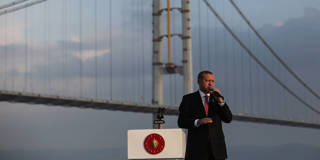By leveraging Turkey’s geopolitical position to secure financial assistance from other countries, Turkish President Recep Tayyip Erdoğan was able to sustain his populist spending spree until Turks cast their ballots in May. But now, reality will bite – and it will not be pretty.
ISTANBUL – Turkish President Recep Tayyip Erdoğan’s victory lap following his re-election last month will be short, because his country is on the verge of economic meltdown. Turkey’s economy was also in crisis when Erdoğan’s Justice and Development Party (AKP) first came to power, in 2002. Back then, Turks overwhelmingly wanted to join the European Union, so the AKP’s government, which Erdoğan led from 2003 until 2014, when he became president, implemented economic reforms and applied for membership.
By 2010, those reforms were working as intended. Per capita income had tripled, leading the World Bank to classify Turkey as an upper-middle-income country. The inflation rate had fallen to single digits from a peak of over 100%, even as the economy grew rapidly. But despite this progress, EU accession negotiations had stalled. With the prospect of membership fading fast, Erdoğan began to turn his back on Europe. His new political strategy was to appeal to the religiosity of rural Turks, a move that entailed a shift from technocratic competence to authoritarian populism.
With a population of 85 million and a geopolitical neighborhood that includes the European Union, Russia, and the Middle East, Erdoğan was always going to have to play a complicated diplomatic game. After failing to secure a wish list of fighter planes and other weaponry from the United States, he bought arms from Russia instead. Last year, he helped broker a deal with Russia to allow grain shipments from Ukrainian ports, and he continues to block Sweden’s entry into NATO, citing the refuge Sweden is providing to individuals tied to the Kurdistan Workers’ Party.

ISTANBUL – Turkish President Recep Tayyip Erdoğan’s victory lap following his re-election last month will be short, because his country is on the verge of economic meltdown. Turkey’s economy was also in crisis when Erdoğan’s Justice and Development Party (AKP) first came to power, in 2002. Back then, Turks overwhelmingly wanted to join the European Union, so the AKP’s government, which Erdoğan led from 2003 until 2014, when he became president, implemented economic reforms and applied for membership.
By 2010, those reforms were working as intended. Per capita income had tripled, leading the World Bank to classify Turkey as an upper-middle-income country. The inflation rate had fallen to single digits from a peak of over 100%, even as the economy grew rapidly. But despite this progress, EU accession negotiations had stalled. With the prospect of membership fading fast, Erdoğan began to turn his back on Europe. His new political strategy was to appeal to the religiosity of rural Turks, a move that entailed a shift from technocratic competence to authoritarian populism.
With a population of 85 million and a geopolitical neighborhood that includes the European Union, Russia, and the Middle East, Erdoğan was always going to have to play a complicated diplomatic game. After failing to secure a wish list of fighter planes and other weaponry from the United States, he bought arms from Russia instead. Last year, he helped broker a deal with Russia to allow grain shipments from Ukrainian ports, and he continues to block Sweden’s entry into NATO, citing the refuge Sweden is providing to individuals tied to the Kurdistan Workers’ Party.